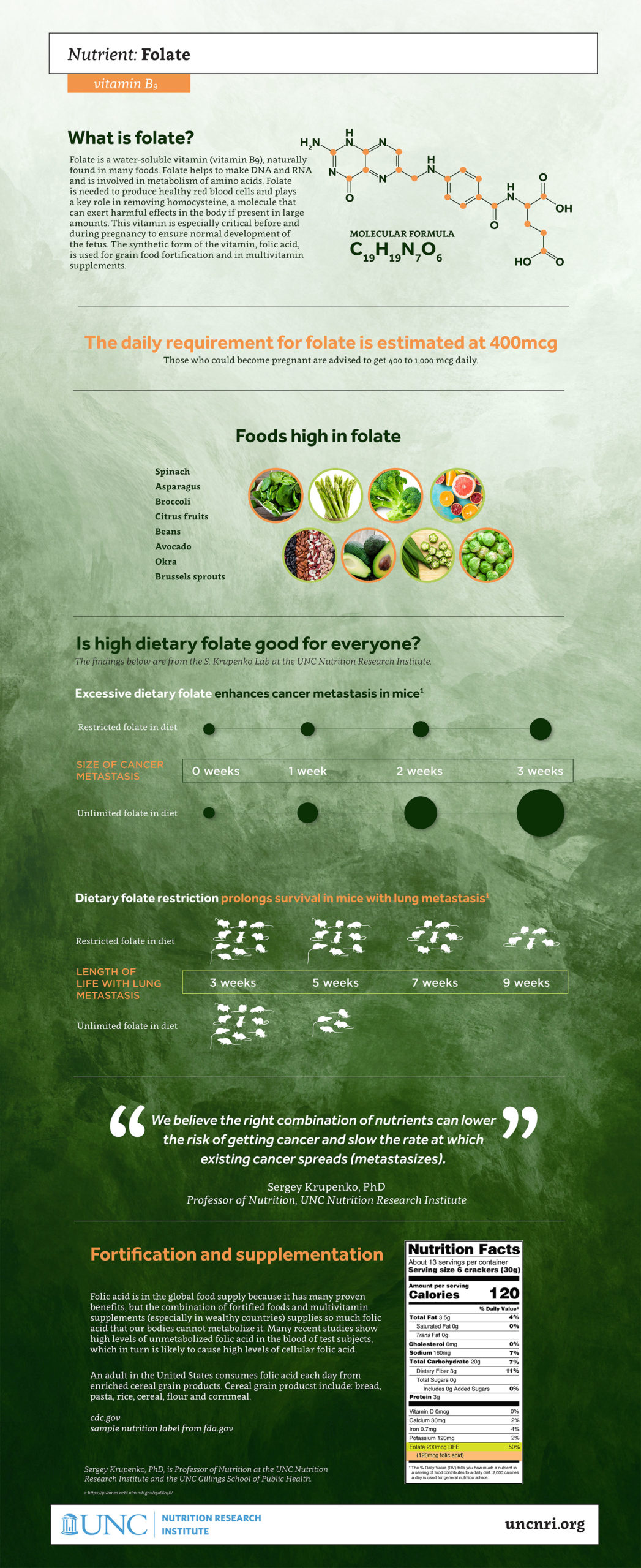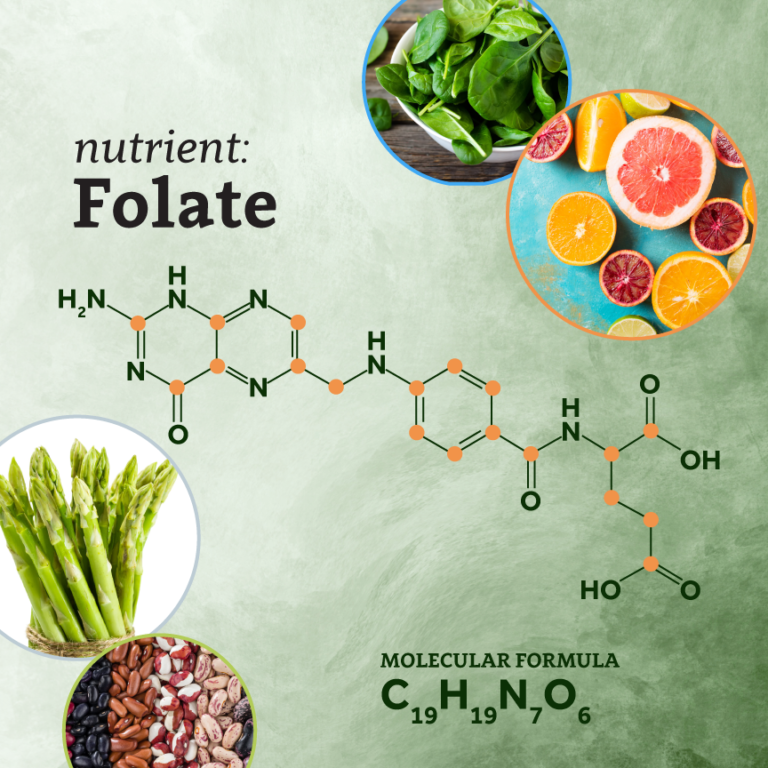Folate is a water-soluble vitamin, naturally found in many foods. Folate helps to make DNA and RNA and is involved in metabolism of amino acids. It is needed to produce healthy red blood cells and plays a key role in removing homocysteine, a molecule that can exert harmful effects in the body if present in large amounts. Folate is especially critical before and during pregnancy to ensure normal development of the fetus. The synthetic form of the vitamin, folic acid (FA), is used for grain food fortification and in multivitamin supplements.
The daily requirement for folate is estimated at 400 mcg. Humans cannot make folate, so we must obtain it from folate-rich foods, or from fortified foods and/or multivitamins. Folate is readily available in many foods, including spinach, asparagus, broccoli, citrus fruits, beans, avocado, okra, and brussels sprouts. For example, a half-cup serving of cooked asparagus contains about 134 mcg of folate, or 34% of the daily value (DV).
Those who could become pregnant are advised to get 400 to 1,000 mcg daily. Folate is crucial during early pregnancy to reduce the risk of birth defects of the brain and spine, known as neural tube defects (NTDs). Research has shown that folic acid supplements can prevent NTD-affected births. Taking a daily prenatal vitamin that contains FA can help ensure that pregnant people get enough of this essential nutrient.
In 1996, the Food and Drug Administration (FDA) made it mandatory to add FA to grain products used to make cereal, bread, pasta, and other foods. The ruling, which was intended to prevent NTDs has been highly successful: The incidence of NTDs fell 36% over the following decade.
The FDA’s ruling was unique because the target population (women of child-bearing age) is much smaller than the population affected (anyone eating fortified foods), especially now that so many countries around the world add FA to wheat, corn, and rice. The good news is that studies around the globe prove that FA benefits the general population by lowering the incidence of heart disease, stroke, and even mood disorders, which is why FA is also present in multivitamin supplements.
Although folate is an essential nutrient, a high amount of dietary folate may not be advised for everyone, however. Findings from the N. Krupenko and S. Krupenko labs at the Nutrition Research Institute have found a distinct difference in the effects of natural folate and the supplement form FA. FA is not present in fresh foods or nonfortified food products. It is a synthetic form of folate with a stable chemical structure — unlike natural folate, which is often destroyed by normal food preparation and storage.
“Cells need folate to grow, especially fast-growing cancer cells,” said Natalia Krupenko, PhD, associate professor of Nutrition at the Nutrition Research Institute. “So, when you supplement with folic acid, cancer cells get the advantage. They grow quickly and need a lot more new material to make their DNA. A supplement gives them that.” Thus, when people with a predisposition to cancer take folic acid supplements, any undetected cancer cells in their bodies will grow at a faster rate.
The Krupenko labs have studied the effects of folic acid supplementation on cancer growth in mice. In one study, half the mice received a diet low in FA, while the others received an average FA diet. Cancerous tumors grew fast and started to impair all mice on the average diet at about five weeks. However, by the same time it barely affected three of the six mice in the group receiving the low folate diet. The other three mice were only mildly affected after nine weeks — nearly twice as long as those on the average diet.
“Limiting folic acid definitely helps suppress the rate of cancer growth, and that is why we are concerned,” said Sergey Krupenko, professor of Nutrition at the UNC Nutrition Research Institute. The labs are continuing experiments to figure out the best ways to make recommendations for people who have a genetic predisposition or are living with cancer.
So, while we need enough natural folate to keep the systems in our bodies functioning properly, when it comes to fortified food and supplementation, what is that magic amount? It is different for every person, and that is why the research, coupled with individualized nutrition recommendations, is so important.
FA is in the global food supply because it has many proven benefits, but the combination of fortified foods and multivitamin supplements (especially in wealthy countries) supplies so much FA that our bodies cannot metabolize it. Recent studies show high levels of unmetabolized FA in the blood of test subjects, which is likely to cause high levels of cellular FA.
“We believe the right combination of nutrients can lower the risk of getting cancer and slow the rate at which existing cancer spreads (metastasizes),” explained Sergey Krupenko.
“There’s no one-size-fits-all approach to biology, to human health,” Natalia Krupenko said. “If we recommend exactly the same intake to everyone, then people whose enzymes aren’t as efficient are at a disadvantage. When we accumulate enough data, we will be able to give people better recommendations, taking the genetic makeup into account. I think that will exclude the possibility that a person will get too much folic acid.”
Sergey Krupenko’s research focuses on vitamin folate and its role in liver function and cancer disease. His goal is to understand how we can fight cancer by controlling the diet and nutrient supplements. Natalia Krupenko’s goal is to determine the best ways to utilize health-protective properties of folate and prevent the possibility of its adverse effects in humans. Together their labs explore folate and its many roles on health.
Stay up-to-date with the Krupenkos’ lab research by subscribing to our emails and following the Nutrition Research Institute on social media by clicking the links below.

